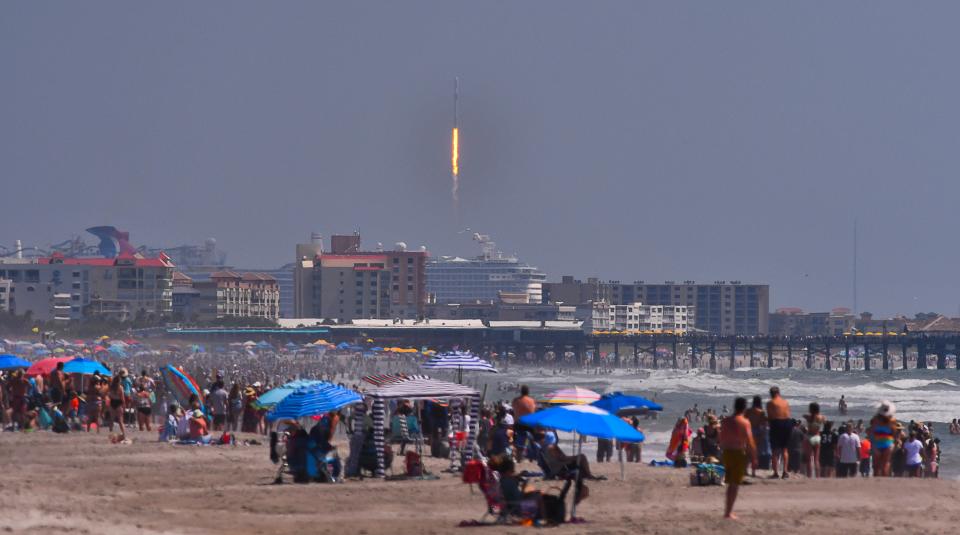SpaceX launches European space telescope from Florida to hunt for dark matter and energy
- Oops!Something went wrong.Please try again later.
A SpaceX Falcon 9 rocket roared away from Cape Canaveral Space Force Station with a $1.5 billion mission designed to study the dark side of the universe on Saturday, marking a break from the Space Coast's usual manifest of communications satellites.
At 11:12 a.m. EDT, the 230-foot rocket took flight from Launch Complex 40 and flew along a southeastern trajectory with Euclid, a European Space Agency mission designed to study dark matter and energy. A successful landing on the Shortfall of Gravitas drone ship marked the booster's second flight so far.
Over the next month, Euclid will finalize its orbit at the L2 Lagrange point about a million miles from Earth, which is also where the now-famous James Webb Space Telescope is located. Lagrange points are areas where gravitational forces from different bodies are balanced, enabling spacecraft to "hover."
Rocket launch schedule: Upcoming Florida launches and landings
The roughly $1.5 billion mission spearheaded by the European Space Agency, along with some input from NASA, aims to study the nature of dark matter and energy. Things visible to scientists – planets, galaxies, and so on – appear to make up just a fraction of what's really out there. Dark matter and energy are believed to comprise upwards of 95% of the universe and are responsible for its structure and rate of expansion, the acceleration of which has puzzled observers for decades.
Euclid, the Space Coast's 33rd mission of the year, was named after the ancient Greek mathematician who lived around 300 BCE. He's more commonly known as the "father of geometry."
If all goes according to plan, Euclid will spend the next few months testing before delivering its first images sometime this fall. Scientists hope to observe billions of galaxies across over a third of the sky.
Beyond Saturday's launch, SpaceX is expected to launch at least twice more this month. Another batch of the company's Starlink internet satellites should fly in the first half, while a triple-core Falcon Heavy rocket is slated to boost a classified Space Force mission from Kennedy Space Center sometime before the month is out. Exact timelines are not yet available.
For the latest, visit floridatoday.com/launchschedule.
Contact Emre Kelly at aekelly@floridatoday.com. Follow him on Twitter, Facebook, and Instagram at @EmreKelly.
Starlink launch: SpaceX launches dozens of Starlink internet satellites from Cape Canaveral in Florida

This article originally appeared on Florida Today: SpaceX launches Euclid telescope from Florida to hunt for dark matter

